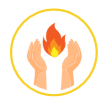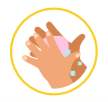Colds - All You Need To Know
Colds - All You Need To Know
YOU CAN USUALLY
MANAGE A COMMON COLD
WITHOUT NEEDING TO SEE
YOUR DOCTOR
We’ve outlined some ways you can stop yourself from catching a cold. Or, if you’re unlucky and do get one, how to treat and ease your symptoms.
WHAT CAUSES
A COLD?
Colds are caused by viruses and are easily spread to other people.1 Basically, if you have the virus, you’re infectious until all your symptoms have gone.1 It’s passed on by coughs or sneezes, or hand contact – germs can live on the hands and on surfaces for up to 24 hours.1,2
Cold viruses are so common that if you have contact with other people, you’re bound to catch one occasionally – if someone coughs or sneezes nearby they can spray the virus out into the air in tiny droplets of mucus, which you can breathe in directly, or pick up from where it has landed on surfaces, and then pass on by touching your eyes, nose or mouth.2
Colds are so common that adults can expect to catch between two to five each year, while children can have as many as 10 a year.3
HOW TO
PREVENT A COLD
It's hard to stop yourself getting exposed to any one of the 200 viruses that can cause the common cold, but you can keep the risk of catching one down to a minimum.3
Obvious as it sounds, but your best bet is to try to keep your distance from infected people and avoid sharing towels or household items, like cups, with them.1,2 That’s not always possible, of course, so the next line of defence is to wash your hands often with warm water and soap for at least 20 seconds, or use an alcohol-based hand sanitiser when you are out and about.1,2 It's a tough one, but try to keep your hands away from your eyes, mouth or nose, because that's how the virus gets transmitted into your body.1,2 Also, keep yourself fit and healthy to help keep your immune system strong.1
Unlike the flu, you can’t take a vaccine to protect yourself against a cold.1,2 That means your body will be constantly working to fight off all those cold viruses.
If you, or someone close to you, has a cold the risk of it spreading can be reduced by washing the hands often with warm soapy water, and using tissues to trap germs, then throwing them in the bin as soon as possible afterwards.1 Also remember to sneeze or cough into your elbow rather than your hands - it's a lot harder to pass the virus on from the crook of your elbow than it is from your hands.1
THE FIRST
SIGNS OF A COLD
Cold symptoms come on gradually and mainly affects your nose and throat.1 The first signs are:3
irritating, scratchy sore throat
sneezing
runny nose
headache
Other common symptoms include:1,4
muscle aches
cough
pressure in your ears and face
runny or blocked nose
Less commonly you might have:
fatigue
fever
chills
loss of taste and smell
HOW TO
TAKE CARE OF A COLD
You can treat a cold yourself. Doctors don’t recommend antibiotics for colds, because they work on bacteria not viruses, so they don't help relieve your cold symptoms or make your get better any quicker.1,2 In fact, taking antibiotics when you don't need them can make them less effective when you do need them against bacterial infections.2
To help yourself get over your cold symptoms, there are some self-care tips:1

rest and sleep

keep warm

drink plenty of fluids to avoid dehydration (fruit juice / squash)

wash you hands to limit germ spread and re-infection
Medicines for colds are easy to pick up from the shelves in your local pharmacy or supermarket - if you’re not sure, ask your pharmacist which one is best for you and your symptoms.
- Decongestant sprays or tablets will help with a blocked nose5
- Painkillers, such as paracetamol or ibuprofen can ease aches and lower fevers.1 Be careful not to combine cold, flu and cough medicines if you're taking paracetamol and ibuprofen tablets as you may end up accidentally taking more than the recommended dose.1
There are a number of Lemsip products available specifically for treating cold symptoms. These include ones you can buy from supermarkets, such as Lemsip Cold & Flu Hot Lemon 500mg Powder for Oral Solution or Lemsip Max Cold and Flu Hot Lemon 1000mg Powder for Oral Solution. If you need something to take on-the-go (swallowed with water), then Lemsip Cough and Cold Capsules with Caffeine could be a good choice for you. Some Lemsip products, such as Lemsip Max Sinus & Flu Hot Lemon Powder for Oral Solution contain pharmacy strength ingredients, so are not available for you to pick up directly off the shelf, so ask your pharmacist if this is the right option for you.
If your symptoms don’t improve after three weeks, or you experience any of the following, see your doctor: 1
your symptoms suddenly get worse
your temperature is very high, or you feel hot and shivery
you’re worried about your child’s symptoms
you have chest pains or difficulty breathing
you have a long term health problem, such as diabetes, or heart, kidney, lung or brain problem
your immune system is weak, e.g. from taking cancer medication or having diabetes
COLDS
WHAT’S THE OUTLOOK?
Most people find their cold symptoms last for about a week, but some unlucky people may have symptoms for another couple of weeks.1,3
The bad news is, as there are over 200 different cold viruses, you're not protected against catching another cold.3 That’s why most adults get between two to five colds each year.
As it’s a mild infection of your respiratory system, all the symptoms are just your body’s natural response to dealing with it (rather than the virus itself).
There isn’t a cure for a cold, and antibiotics won’t have any effect.1 But there are lots of Lemsip cold and flu remedies that can help with symptoms, and they are available over the counter, from your local pharmacy.
Taking remedies to manage your cold symptoms mean you can get on with everyday life - just take care not to pass your cold to anyone else.
RB-M-02121
References:
- Health Services Executive. Common cold. Accessed August 2020. https://www2.hse.ie/conditions/common-cold.html.
- Centers for Disease Control and Prevention. Common colds - protect yourself and others. Accessed August 2020. https://www.cdc.gov/features/rhinoviruses/.
- Eccles R. Lancet Infect Dis, 2005;5:718-725.
- Health Services Executive. Symptoms of coronavirus. Accessed August 2020. https://www2.hse.ie/conditions/coronavirus/symptoms.html.
- Deckx L, et al. Cochrane Database of Systematic Reviews, 2016, Issue 10. Art. No.: CD009612. DOI: 10.1002/14651858.CD009612.pub2.
Lemsip Cold & Flu Hot Lemon 500mg Powder for Oral Solution contains paracetamol.
Lemsip Max Cold and Flu Hot Lemon 1000mg Powder for Oral Solution contains paracetamol.
ALWAYS READ THE LABEL

Although these symptoms are the same for adults and children, they can last longer in children.1 In general, adults can expect to have symptoms for about a week, but some people find these can last a couple of weeks longer.1,3